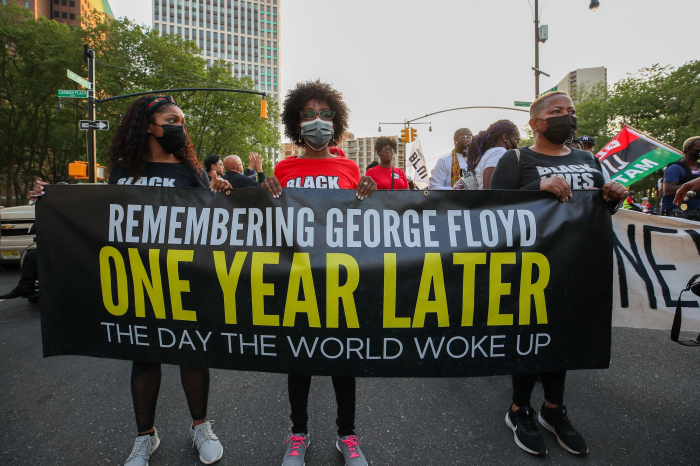The anniversary of George Floyd’s death was supposed to be a milestone moment, a time to mark the passage of legislation to "root out systemic racism” in the criminal justice system, in the words of U.S. President Joe Biden.
Instead, Floyd’s family visited Washington on Tuesday to mourn with Biden and prod Congress to act as they commemorate the loss of their brother, father and son one year ago.
"Today is the day that he set the world in a rage,” Floyd's brother Philonese said, addressing reporters at the Capitol alongside family members, Democratic House Speaker Nancy Pelosi and other lawmakers. "And people realized what's going on in America, and we all said, ‘Enough is enough.’” He added, "We need to be working together to make sure that people do not live in fear in America any more.”
His death sparked a global reckoning over racism and growing calls for police reform, but a legislative response has been elusive. Still, congressional negotiators remain optimistic about the prospects for a bill and they’ve displayed steady solidarity that’s unusual for such talks, striking a consistently optimistic tone and never publicly sniping at each other. "We hope to bring comfort to your family by passing the final bill very soon,” Pelosi said.
It’s a high-profile legislative fight where Biden has notably taken a back seat, preferring to leave the work of crafting a compromise to lawmakers on Capitol Hill, in contrast to his fevered advocacy, both public and private, for his infrastructure bill and the COVID-19 relief package.
"We have been respecting the space needed for negotiators to have these discussions,” White House Press Secretary Jen Psaki said. She and congressional negotiators declined to offer a new deadline for reaching an agreement.
California Rep. Karen Bass, the top House Democratic bargainer, said talks would continue "until we get the job done” while the top Republican bargainer, South Carolina Sen. Tim Scott, said separately that negotiations "have a long way to go still but it’s starting to take form.”
The Floyd family was also meeting Tuesday with Biden at the White House. Biden told the family “that he doesn’t want to sign a bill that doesn’t have substance and meaning so he is going to be patient, to make surest is the right deal, not a rush bill,” Ben Crump, the family lawyer, said.
“This is a police issue. This is a civil rights issue. We have to look at this as a national issue that we have avoided dealing with for far too long,” Crump told reporters at the White House. In a statement after the meeting, Biden called on Congress to act.
“The battle for the soul of America has been a constant push and pull between the American ideal that we’re all created equal and the harsh reality that racism has long torn us apart,” Biden said. “At our best, the American ideal wins out.”
The Democratic-controlled House approved a sweeping bill in March that would make it easier for individual police officers to be sued and charged with crimes. It would also ban chokeholds, limit no-knock warrants and create a national database of officers with histories of complaints and disciplinary problems.
That bill has gone nowhere in the Senate, where the 50 Democrats will need support from at least 10 Republicans to overcome a bill-killing filibuster. GOP lawmakers have preferred more modest changes. While Biden set the anniversary of Floyd’s death as the initial deadline for legislation to reach his desk, the issue of police reform is a particularly politically thorny one.
Congressional negotiators have struggled to find a compromise that can make it through an evenly divided Senate. Crump called on Biden to "reiterate that we need to get it passed.”
White House advisers say Biden and his team have been in frequent touch with Capitol Hill negotiators over the legislation, but they believe this is an issue in which a high-profile public campaign by the president may do more harm than good. But some activists say they’d like to see the president be more outspoken in advocating for the bill.
"President Biden has left it to members of Congress, and it’s in their hands right now. But the president will need to step up to make sure we get it across the finish line,” said Judith Browne Dianis, executive director of the Advancement Project, a racial justice organization.
Still, it's up to Congress, said Wade Henderson, interim president and CEO of the Leadership Conference on Civil and Human Rights, in a statement to The Associated Press (AP). "It’s absolutely vital that members of Congress put partisan politics aside and pass meaningful reform to hold police officers responsible who act outside of their oath to protect and defend,” he said.
Floyd died on May 25, 2020, after former Minneapolis police officer Derek Chauvin kneeled on his neck for more than nine minutes, while Floyd repeatedly said he couldn’t breathe. His death sparked months of nationwide protests focused on racism and a renewed debate over police reform in the U.S. Chauvin was convicted last month on multiple charges stemming from Floyd’s death.
Congressional negotiators’ chief stumbling block has been "qualified immunity,” which generally shields individual officers from civil lawsuits. Democrats have wanted to eliminate that protection while Scott has proposed retaining that immunity for officers but allowing lawsuits against police departments.
While progressives and many criminal justice reform advocates are insistent that the bill eliminates protections for individual officers, some Democrats, most notably House Majority Whip Jim Clyburn of South Carolina and Senate Democratic Whip Dick Durbin of Illinois have said they could see a compromise on the issue. Senate Minority Leader Mitch McConnell has said he wouldn’t support any bill that ends qualified immunity.
More about: #GeorgeFloyd









-1747837442.jpg&h=190&w=280&zc=1&q=100)






































